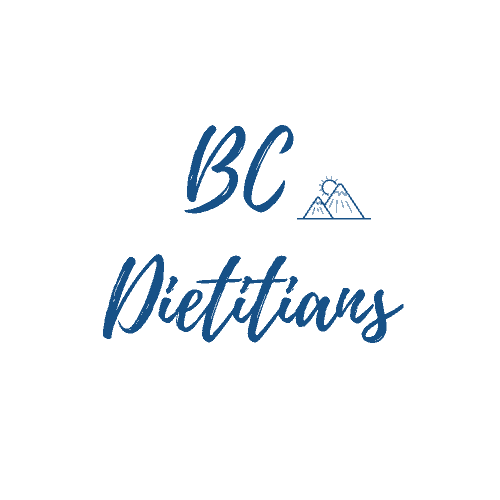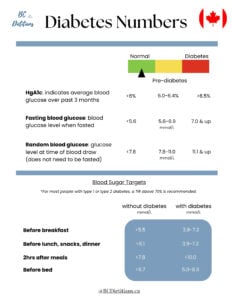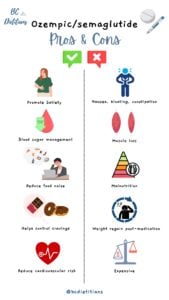Find a Diabetes Dietitian Near You
BC Dietitians can Help You Understand and Manage Diabetes
You went to the doctor and they told you that you have diabetes. Now what?
- Do you cut out all carbs and go sugar free ?
- Do you avoid all starchy foods and fruits?
- Do you need to start counting all the carbohydrate you are eating?
- Do you need to start medications and/or insulin?
- Do you need to follow a special diabetes diet plan?
Managing diabetes isn’t about eliminating foods—it’s about keeping your blood sugar stable and reducing risks of other chronic diseases without having to give up your favorite foods!
In 2021-2022, the Canadian Chronic Disease Surveillance System reported 3.7 million Canadians were living with diabetes.
Diabetes is a metabolic disorder characterized by high blood sugar that is caused by either defective insulin action (a hormone produced by your pancreas to control blood sugar levels), defective insulin secretion or a combination of both.
When blood sugars are too high, this can result in acute and long term complications and increases your risks for heart disease, kidney disease and lower limb amputations.
We provide nutritional counselling for children and adults diagnosed with:
- Prediabetes: Blood sugar levels are higher than normal but not yet diagnosed as diabetes. With the right diet and physical activity, you may be able to prevent type 2 diabetes.
- Type 1 Diabetes: This form of diabetes requires insulin therapy. A diabetes dietitian can help balance carbohydrates, insulin, and physical activity to keep blood sugar levels stable.
- Type 2 Diabetes: The most common type, often linked to weight, diet, and lifestyle. A diabetes nutritionist near me can help with meal planning, weight management, and long-term blood sugar control
- Gestational Diabetes (GDM) : Develops during pregnancy due to hormonal changes. A registered dietitian nutritionist can help you eat well, manage blood sugar, and reduce risks for you and your baby. GDM affects about 10% of women who give birth.
You can calculate your risk score for diabetes here!
How a Diabetes Dietitian Can Help
A diabetes dietitian near you can:
✔ Explain your diagnosis and what it means
✔ Create a personalized nutrition plan
✔ Help you lose weight if needed
✔ Offer nutritional counselling to improve blood sugar control
✔ Debunk myths around diabetes diet
✔ Support physical activity and meal planning
Book a Diabetes Dietitian today
Frequently Asked Questions
A diabetes diet plan is a eating plan that helps manage your blood sugar, manage your blood pressure (if applicable), manage your cholesterol (if applicable), helps you get to or maintain your healthy weight and reduce the risk of diabetes complications including stroke and/or heart attack.
Here are some general recommendations for a diabetes diet:
- Get enough fiber – ie. 30-50 g fiber/day with 10-20 g/day coming from soluble fiber sources (ie. oranges, strawberries, oats, lima beans, avocado). Calculate your fiber needs here.
- Choose lower glycemic index carbs often – lower GI foods may have less effect on your blood sugar than higher GI foods
- Eat less than 10% of total daily calories as added sugars
- Less than 10 g/day sugar alcohols
Diabetes dietitians typically have clinical experience working in hospitals, diabetes clinics that treat patients with diagnosed diabetes.
These RDs will also partake in continuing education to stay current with the latest research, treatment guidelines, and best practices in diabetes nutrition.
A diabetes dietitian can help you with the following :
- learn why your body is not managing your blood sugar effectively and how to improve this for you specifically
- understand optimal eating times to stabilize your blood sugars
- understand how many grams of carbs, fiber and protein to aim for at a meal and snack
- understand food pairings that can help stabilize your blood sugars
- achieve and maintain healthy weight
- manage other comorbidities ie. high cholesterol, high blood pressure, PCOS
- reduce risks for other complications ie. heart diseases, heart failure, kidney disease, lower limb amputations
- avoid unnecessary food restrictions
Typically, remission may be possible if:
- You have been diagnosed with Type 2 Diabetes for less than 6 years
- Are able to lose weight if you’re over weight
- A1C ranges from 6.0-6.5% for a period of time
- Are not taking insulin
We make it easy for your to find a specialized diabetes dietitian in BC.
Check out the dietitians listed on this page. Look through the diabetes dietitians and click on their profiles to read more about their qualifications such as certified diabetes educators, experience, and services.
Connect directly with your diabetes dietitian and get started !




















